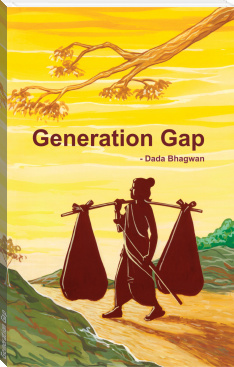Guru and Disciple - Dada Bhagwan (top 10 motivational books .txt) 📗

- Author: Dada Bhagwan
Book online «Guru and Disciple - Dada Bhagwan (top 10 motivational books .txt) 📗». Author Dada Bhagwan
According to common knowledge, people consider a guru, a satguru and a Gnani as one and same, whereas here in this book, Dadashri gives us a clear distinction between the three.
How can one walk the spiritual path without the one who is already familiar with that path? To be familiar means to be a guide.
Here, in this book, you gain knowledge and understanding of what the leader of the path of moksha – the ultimate guru – should be like.
With the aim and the vision that both guru and his disciple can go forth on the path of liberation, Dadashri, who while moving around in the supreme spiritual state as the Gnani, gives various visions and understanding regarding the guru-disciple relationship. There was no one more humble than He was. The understanding given to us by way of the Gnani’s speech is presented here, which will become a guide to all traveling the path of liberation.
- Dr. Niruben Amin
The Guru and the Disciple
Guru means Guide
Questioner: I have tried many spiritual paths and teachers for the answer to the term ‘Guru’ and everywhere I have searched; I have not received any satisfactory answers.
Dadashri: If you want to go to the station from here and get lost on the way, will you not have to ask someone for help? Whom would you ask?
Questioner: Someone who knows the way.
Dadashri: The one that knows, is a guru. As long as you do not know the way, you need to ask someone; you may even have to ask a small child. Whomever you ask becomes your guru. Only when there is a guru will you find the way. What would happen without your eyes? The guru is the other eye. He clarifies your path and gives you the light to go ahead. This light is called sooj.
Who needs a Guru?
Questioner: Do you mean to say that a guru is necessary?
Dadashri: It is like this: the road on which one gets lost is the road he is not able to figure out. If you do not know the way to the station, then it is a problem. However, if along the way, you encounter someone who knows the way, then you will reach the station quickly, will you not?
Questioner: Yes, that is true.
Dadashri: So you need someone who has the knowledge. It is not as if the person showing you the way is telling you to ask him. You are asking him out of your own necessity, are you not? For whose benefit are you asking?
Questioner: For my own benefit.
Dadashri: Or you can keep on walking without asking anyone and try to experience that! That experience will teach you that there is a need for a guru. I will not have to teach you.
So there is a path, but there is no one to show it to you, is there? Only if there were someone to show you that path can your work be accomplished.
Will you not need a guru or an experienced guide (bhomiyo)? Whoever is the guru, we are considered his followers. The guru walks ahead and shows us the way. Such a person is considered an experienced guide.
If a man takes the road going in the opposite direction of Surat, is he likely to reach Surat station if he keeps going in that direction? No matter how much he roams, he will not be able to find Surat station. The night would fall and the day would come but he would still not find Surat station. Such is the confusion here.
When you are lost, a guide is your friend
Questioner: None of the gurus shows the right path.
Dadashri: But those gurus themselves do not know the way, so what can anyone do? No one has found an experienced guide yet. If he had, then he would not have these problems. If you had found such a guide, in addition to showing you the station he would also tell you which train to take. He would show you everything and your task would be finished. Here we have a situation where the guide, too, is lost and, therefore, he makes his follower wander around life after life. So find yourself a true, experienced guide who can show you the station. If not, he will make you wander around aimlessly.
If a blind person leads another blind person, where will they both end up? A true, experienced guide will immediately show you the way. Nothing will be pending; you will see instant results. You have not found a real experienced guide (bhomiyo). Therefore, find such a person.
Questioner: But would such a guide not be our superior?
Dadashri: The experienced guide is a superior – but to what extent? Only to the extent, that he takes us to the final destination.
That is why you absolutely need someone above you, someone to show you. You need an experienced guide. You always need a guide. You will need a guide in every situation. No work can be done without a guide. If we want to go to Delhi and we look for a guide, then what is he if not a guru? If we give him money, he becomes our guide. A guru is someone who shows you the way as a guide.
Questioner: Therefore, one definitely needs someone who clarifies and shows the path.
Dadashri: Yes, the person who shows you the path is a guru, whoever he may be.
Support of a Guru is necessary at every level
Questioner: I walk along the path shown by the guru. Thereafter, do I need him? Alternatively, do I need to leave him?
Dadashri: No, he is necessary until the very end.
Questioner: Why do we need him afterwards?
Dadashri: You do not have accidents because you have brakes in your car. Should you remove the brakes?
Questioner: What is the need of hanging on to him once he shows me the way?
Dadashri: You will need a guru until the very end. The guru needs his own guru. When do we need schoolteachers? Don’t you need them when you wish to become educated? And what if you do not want to study? If you do not want to benefit from anything then there is no point in making someone your guru, but if you wish to benefit, then you need to have a guru. It is not mandatory; it is voluntary. If you want to learn, you need a teacher. If you want to know about spirituality, then you need a guru, and if you do not wish to know anything, then it does not matter. There is no law that says you have to do it this way.
Here, even if you want to go to the station, you need a guru. Therefore, won’t you need a guru for religion? You need a guru at every level.
There is no knowledge without a Guru
Without a guru, no knowledge of any kind can be attained. Neither worldly knowledge nor spiritual knowledge can be attained without a guru. It is wrong to have expectations of knowledge (Gnan) without a guru.
Questioner: One man says that Gnan (Gnan Vidhi in Akram) is not something that is to be taken or given, but rather it is something that happens. Can you explain this?
Dadashri: This is a discovery of people who are deluded. They claim, “Gnan is not to be taken, neither is it to be given. Gnan happens spontaneously”, but that state of delusion never leaves.
One grows up learning the knowledge he has been given. The teacher gives you knowledge and you take it. You in turn give that knowledge to others. Knowledge by its nature involves give and take.
Questioner: But can one not attain Gnan spontaneously?
Dadashri: Only rarely will one attain Gnan spontaneously, however, that is an exception; he may not have a guru in this lifetime, but he must have had one in his previous life. Otherwise, everything is dependant upon a nimit (someone who is instrumental evidence in a process). When you come across a nimit like me, your work is done, but until then you have to work on furthering your spiritual progress by yourself. Then, if you meet the Gnani Purush as a nimit, because of that nimit, everything will manifest.
Questioner: So a person cannot become Self-realized on his own?
Dadashri: Nothing can be attained with one’s own effort. No one in this world has ever attained that. If one were meant to attain the experience on his own, then there would be no need for schools, would there? There would be no need for colleges either, would there?
Spontaneous enlightenment is extremely rare
Questioner: The Tirthankaras are considered to have become enlightened spontaneously (swayambuddha), are they not?
Dadashri: Yes, the Tirthankaras are all swayambuddha (spontaneous enlightened), but they bound a birthright as a Tirthankara in their previous life because of a guru. Thus they are considered swayambuddha with reference to the perspective that they do not have a guru in this life. It is a relative thing. Those who have become swayambuddha today had asked many questions in their previous life. Therefore, everything in the world happens through asking. Only a rare one will become swayambuddha
enlightened spontaneously, but that is an exception. Otherwise, there is no gnan (knowledge) without a guru.
Questioner: It is said that Lord Rushabhdev destroyed his karmic bondage on his own, so does that mean that he did not need anyone?
Dadashri: But he had taken some help earlier on. He asked for help from a guru two or three lives before. No one has become free without enlisting help. There is a nimit even in this. It was the people during the time of Lord Rushabhdev who claimed that the Lord destroyed his karmic bondage on his own. However, it is not possible to do this on one’s own – it has never happened that way before and it never will. That is why you will always need a nimit.
Questioner: Who were the gurus of Lord Mahavir?
Dadashri: Lord Mahavir had many gurus, but not in his last couple of lifetimes. It is not so easy to become spontaneously enlightened. Tirthankaras do not need a guru in their final life.
How long is a guru necessary?
Questioner: Eklavya (a student of Dronacharya who trained Arjun in archery but refused to train Eklavya) attained powers (siddhi) and became a master archer, even though he had no guru. So is it not possible?
Dadashri: The siddhis that Eklavya acquired were exceptional, but this is not always the rule. Every rule can have an exception; moreover, these exceptions are rare. However, because of the exception, we cannot accept the





Comments (0)